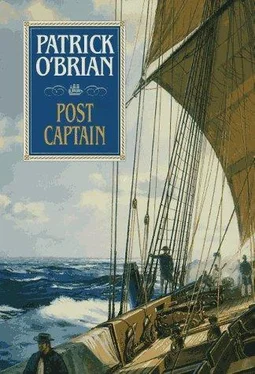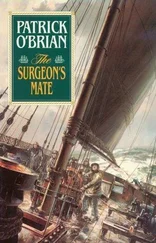Patrick O'Brian - Post captain
Здесь есть возможность читать онлайн «Patrick O'Brian - Post captain» весь текст электронной книги совершенно бесплатно (целиком полную версию без сокращений). В некоторых случаях можно слушать аудио, скачать через торрент в формате fb2 и присутствует краткое содержание. Жанр: Книги. Описание произведения, (предисловие) а так же отзывы посетителей доступны на портале библиотеки ЛибКат.
- Название:Post captain
- Автор:
- Жанр:
- Год:неизвестен
- ISBN:нет данных
- Рейтинг книги:5 / 5. Голосов: 1
-
Избранное:Добавить в избранное
- Отзывы:
-
Ваша оценка:
- 100
- 1
- 2
- 3
- 4
- 5
Post captain: краткое содержание, описание и аннотация
Предлагаем к чтению аннотацию, описание, краткое содержание или предисловие (зависит от того, что написал сам автор книги «Post captain»). Если вы не нашли необходимую информацию о книге — напишите в комментариях, мы постараемся отыскать её.
Post captain — читать онлайн бесплатно полную книгу (весь текст) целиком
Ниже представлен текст книги, разбитый по страницам. Система сохранения места последней прочитанной страницы, позволяет с удобством читать онлайн бесплатно книгу «Post captain», без необходимости каждый раз заново искать на чём Вы остановились. Поставьте закладку, и сможете в любой момент перейти на страницу, на которой закончили чтение.
Интервал:
Закладка:
- a curious dead thump, like a padded hammer a great way off, a sound devoid of overtones and so distinct that it was sometimes possible to distinguish each of the eight carronades, whose fire would have seemed simultaneous in the open air.
They listened, tried to calculate the direction, worked out the weight of metal - four hundred and thirty-two pounds for the Lord Nelson, three hundred and ninety-two for the brig - and the possibility of bringing it into play. ‘Azéma is using his big guns alone,’ observed Jack. ‘Concentrating on her masts, I make no doubt.’ Sometimes the Seagull hit them, and they cheered, full of speculation as to the place of the strike; once a sudden rush in the well and a renewed activity of the pump made it clear that the Lord Nelson had been holed between wind and water, probably in the forepeak; and once a great metallic clang made them think that a gun had been struck; perhaps dismounted.
Towards three o’clock in the morning the candle went out, and they lay in darkness, listening, listening, sometimes regretting their coats, rugs, and pillows and food, and sometimes dozing. The firing went on and on: the Seagull had given up her broadsides and was firing gun by gun; the Lord Nelson had never done anything else throughout the engagement - a steady, deliberate rhythm hour after hour.
Miss Lamb woke with a scream: ‘It was a rat! A monstrous great wet rat! 0 how I regret my trousers!’
Extreme attention slackened as the long night wore on. Once or twice Jack spoke to Major Hill and to Pullings and had no reply. He found that his counting of the shots was mingling with a calculation of the number of sick and wounded under Stephen’s hands - with observations made to Sophia - with thoughts of food, of coffee, and the playing of the D minor trio - Diana’s rough glissando and the deep sustaining note of the ‘cello, as they played three-handed.
A flood of light, the grinding of the chain and grating, and he was conscious that he had been three parts asleep.
Not wholly, since he knew that the firing had stopped this last/hour and more, but enough to feel shifty and ashamed.
On deck it was raining, a thin drizzle from a high sky - very little wind, and that a land-breeze; Captain Azéma and his people looked deathly pale, tired, but undisturbed
- too worn for outward pleasure, but undisturbed. Under her fore and main topsails the Lord Nelson was slipping along through the water close-hauled, away from the motionless Seagull, far away on her starboard quarter: even at this distance Jack could see that she had suffered badly. Her foreyard was gone, her maintopmast seemed to be tottering, there was a great deal of wreckage on her deck and dangling over her side: four gun-ports beat in: strangely low in the water: pumps hard at work. She had hauled off to refit, to stop her leaks, and the likelihood of her renewing the action - of being able to renew the action- was.
Captain Azéma had been bent over a gun, laying it with the very greatest care: he gaged the roll, fired, sending a ball plumb amidships into the repairing party. He waited for the flight of the shot, said ‘Carry on, Partre,’ and stepped back to his mug of coffee, steaming on the binnacle.
It was perfectly allowable; Jack might have done the same; but there was something so cold-blooded about it that Jack refused a draught from the mug and turned to look at the Lord Nelson’s damage and at the coast, barring the whole eastern horizon now. The damage was heavy but not crippling; Azéma had not made quite the landfall he had expected - that was Cape Prior right ahead - but he would be in Corunna road by noon. Jack ignored the second gun: he tried to make out why it should wound him so, for he had no particular friend aboard the Seagull. He could not clarify his mind, but he knew he felt the most furious enmity for Azéma, and it was with more than the ordinary leap of delight, of hope revived when all seemed lost, that he saw the first ship round that Spanish headland, heading north. A homeward-bound line-of-battle ship, HMS Colossus, followed by the Tonnant, eighty.
The mast-head hailed ‘Two ships of the line’. But two more followed: a very powerful squadron, all sails abroad, and holding the weather-gage. There was not the slightest chance of escape. Mute, weary consternation; and in the silence Jack stepped to the pointed eighteen-pounder, laid his hand on the lock and said coldly, ‘You must not fire that gun, sir. You must strike your colours to the brig.’
CHAPTER SIXAt five minutes to eight Jack Aubrey walked quickly through the dreary rain over the cobbles of the Admiralty courtyard, pursued by the voice of the hackney coachman. ‘Fourpence! Call yourself a gent? The poor bleeding Navy’s half-pay shame, that’s what I call you.’
He shrugged, and ducking under the overflow from the gutter he hurried into the hail, past the main waiting-room and on to the little office called the Bosun’s Chair, for he had a First Lord’s appointment, no less. The fire was beginning to draw, sending up a strong writhe of yellow smoke to join the yellow fog outside, and through the yellow shot darts of red, with a pleasant roar and crackle; he stood with his back to the chimneypiece, looking into the rain and mopping his best uniform with a handkerchief. Several figures passed dimly through the Whitehall arch, civilians under umbrellas, officers exposed to the elements: he thought he recognized two or three -certainly that was Brand of the Implacable - but the mud deep in the buckles of his shoes occupied him too much for close attention.
He was in a high state of nervous excitement - any sailor waiting to see the First Lord must be in a high state of nervous excitement - yet the surface of his mind was taken up less with his coming interview than with getting the utmost possible service from a single handkerchief and with vague darting reflections upon poverty - an old acquaintance, almost a friend - a more natural state for sea-officers than wealth - wealth very charming
- should love to be rich again; but there was the loss of all those little satisfactions of contriving - the triumph of a guinea found in an old waistcoat pocket - the breathless tension over the turn of a card. The hackney-coach had been necessary, however, with the mud ankle-deep, and this damned south-wester: best uniforms did not grow on trees, nor yet silk stockings.
‘Captain Aubrey, sir,’ said the clerk. ‘His lordship will see you now.’
‘Captain Aubrey, I am happy to see you,’ said Lord Melville. ‘How is your father?’
‘Thank you, sir, he is very well - delighted with the election, as we all are. But I beg your pardon, my lord. I am out of order. May I offer you my very best congratulations on your peerage?’
‘You are very good - very good,’ said Lord Melville, and having answered Jack’s civil inquiries for Lady Melville and Robert, he went on, ‘So you had a lively time of it, coming home?’
‘We did indeed, my lord,’ cried Jack. ‘But I am astonished you should know.’
‘Why, it is in the paper - a passenger’s letter to her family, describing the Indiaman’s capture and recapture. She mentioned you by name - says the handsomest things. Sibbald pointed it out to me.’
That infernal girl, that Lamb, must have sent her letter by the revenue cutter: and there he had been, hurrying up from Plymouth on borrowed money to reach a London filled with bums forewarned, all waiting to arrest him for debt, charmed with the idea of tossing him into the Fleet or the Marshalsea to rot until the war was over and all chance gone. He had known many officers with their careers ruined by a tipstaff - old Baines, Serocold. . . and there he had been, prancing about the town, dressed like the King’s birthday for every sneaking attorney to behold. The thought made him feel cold and sick: he said something about ‘quite amazed - had posted up from Plymouth with not more than a couple of hours at his father’s place - thought he had certainly outrun the news.’ Yet it must have made tolerable sense, for Lord Melville only observed in that Scotch voice of his, ‘I am sure you used your best endeavours. but I wish you could have come more betimes
Читать дальшеИнтервал:
Закладка:
Похожие книги на «Post captain»
Представляем Вашему вниманию похожие книги на «Post captain» списком для выбора. Мы отобрали схожую по названию и смыслу литературу в надежде предоставить читателям больше вариантов отыскать новые, интересные, ещё непрочитанные произведения.
Обсуждение, отзывы о книге «Post captain» и просто собственные мнения читателей. Оставьте ваши комментарии, напишите, что Вы думаете о произведении, его смысле или главных героях. Укажите что конкретно понравилось, а что нет, и почему Вы так считаете.












